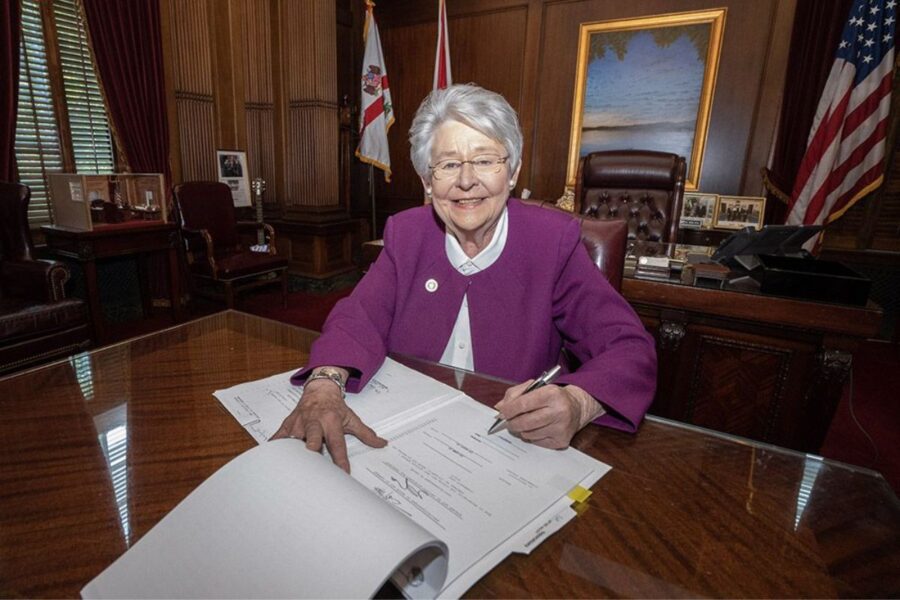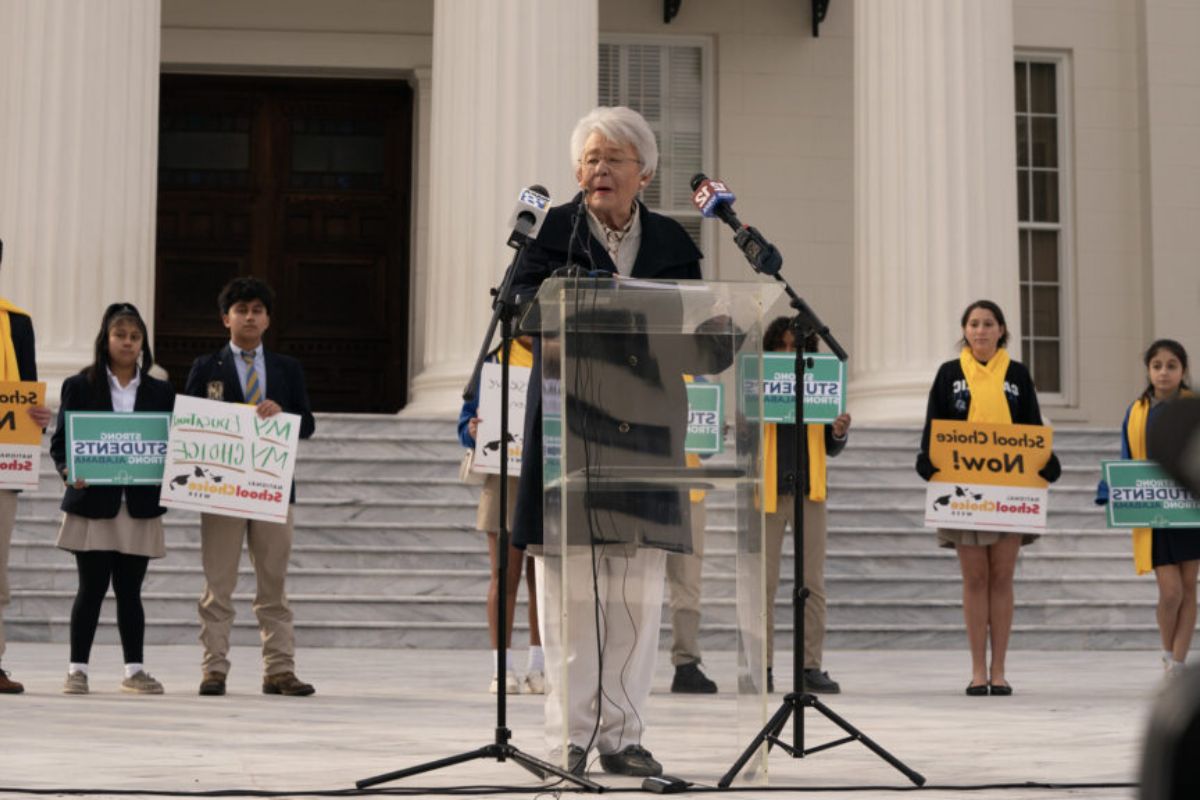Governor Ivey School Choice Movement: Governor Ivey’s commitment to prioritize Education Savings Accounts (ESA) has sparked a school choice movement at the state capitol. With past consideration of ESA bills and Senator Larry Stutts’ frustration, the movement has garnered both support from private schools and criticism from the public education sector.
As voucher advocates and critics raise concerns, Governor Ivey‘s plan aims to navigate the challenges surrounding education choice. Implications of the Governor’s school choice movement at the state capitol.
Key Takeaways
- Governor Ivey prioritizes Education Savings Accounts as her top legislative priority, demonstrating her commitment to improving educational opportunities for all children in Alabama.
- Previous consideration of ESA bills in the Alabama Legislature has faced difficulties and political obstacles, raising concerns about the effectiveness of education reform.
- Private school administrators and the Eagle Forum support school choice, believing it provides parents with more options and improves education through competition.
- Critics, including public school administrators and the Alabama Education Association, raise concerns about accountability and the potential depletion of resources from underfunded public schools.
Governor Ivey Pledges to Make Education Savings Accounts Top Priority
Governor Ivey’s commitment to making Education Savings Accounts her top legislative priority demonstrates her dedication to improving educational opportunities for all children in Alabama.
By emphasizing the need for a solid educational foundation, regardless of location, Governor Ivey is addressing the inequality in access to quality education.
Education Savings Accounts offer a solution by providing parents with the ability to choose the best educational options for their children, whether it be private schools, homeschooling, or specialized programs.
This initiative aims to empower parents, giving them the flexibility and freedom to make educational decisions that align with their child’s unique needs and aspirations.
Past Consideration of ESA Bills and Sen. Larry Stutts’ Frustration
The previous consideration of ESA bills by the Alabama Legislature, including one introduced by Sen. Larry Stutts in the last session, has led to frustration and concerns about political maneuvers in the legislative process.
Sen. Stutts, representing Sheffield, has expressed his disappointment over the lack of progress in advancing the bill. He believes that political maneuvering has hindered its success, making it difficult to navigate through the complex legislative journey.
This frustration highlights the challenges faced by legislators when trying to push for education savings accounts (ESAs) in Alabama.
The bill’s journey, which involves moving between committees before reaching the full Senate, has further contributed to its difficulties. The slow progress and political obstacles encountered along the way have sparked concerns about the effectiveness of the legislative process in addressing education reform.

READ MORE: Governor Ivey Landmark School Choice Bill Takes Center Stage
Support from Private Schools and Critics from Public Education
Despite significant support from private school administrators and the Eagle Forum, the proposed legislation on school choice has faced criticism from public school administrators and the Alabama Education Association, raising concerns about accountability and the potential impact on public school funding.
Private school administrators and the Eagle Forum argue that school choice will provide parents with more options and empower them to make decisions about their child’s education. They believe that competition from private schools will drive improvement in public schools.
However, critics, including public school administrators and the Alabama Education Association, express concerns about accountability. They worry that private schools may not be held to the same standards as public schools, leading to a lack of oversight and potential inequities in education quality.
Additionally, critics argue that diverting public funds to private schools will deplete resources from already underfunded public schools, exacerbating existing inequalities.
The ongoing debate highlights the complexities and challenges of implementing school choice policies.
Voucher Advocates and Critics Raise Concerns
Voucher advocates and critics continue to raise concerns about the implications of school choice, particularly regarding accountability and the potential impact on public school funding.
Some of the concerns raised by voucher advocates include:
- Auditable System: Advocates argue that the voucher system could be auditable in real time, ensuring accountability and transparency in the use of funds.
- Limited Impact on Public School Funding: They contend that federal and local funds are not tied to enrollment, suggesting that a small percentage of students’ departure wouldn’t diminish overall funding.
On the other hand, critics express the following concerns:
- Diversion of Public Funds: Critics challenge the assertion that vouchers would not negatively impact public school funding, expressing concerns about diverting significant public funds from the Education Trust Fund.
- Accountability: Critics also question the level of accountability in the voucher system, fearing that it may lead to a lack of oversight and potential misuse of funds.
These ongoing debates highlight the complex issues surrounding school choice and the need for careful consideration of its potential consequences.

Governor Ivey’s strategy for addressing education choice challenges and implementing a school choice model centered around Education Savings Accounts is eagerly anticipated. Alabama faces several challenges in navigating the implementation of such a model.
One key challenge is resource allocation, as the introduction of Education Savings Accounts may require a redistribution of funding between private and public education systems.
Another challenge is ensuring accountability, as the state will need to establish clear guidelines and oversight measures to ensure that taxpayer dollars are being used effectively.
Additionally, the potential impact on both private and public education systems must be carefully considered, as the introduction of school choice may lead to changes in enrollment patterns and funding distribution.
Governor Ivey’s plan, to be unveiled in her State of the State address, is expected to provide guidance on how these challenges will be addressed.
Conclusion Of Governor Ivey School Choice Movement
In conclusion, Governor Ivey’s pledge to prioritize education savings accounts at the state capitol has generated support from private schools while facing criticism from public education advocates.
Voucher advocates and critics have raised concerns about the potential impact of these accounts.
Governor Ivey’s plan aims to navigate the challenges of education choice, but its implementation and effectiveness remain to be seen.
Our Reader’s Queries
Who was the longest serving governor in the history of Alabama?
George Wallace holds the record as the longest-serving governor, with an impressive tenure of 16 years spanning four terms.
Is governor Ivey married?
Twice married and divorced, Ivey has no children. She first tied the knot with Ben LaRavia while they were both at Auburn University. Ivey is a part of First Baptist Church in Montgomery and in 2019, she received a diagnosis of lung cancer.
How many terms can Alabama governor serve?
Alabama’s top leadership is made up of the governor, lieutenant governor, and executive agencies (referred to as departments in Alabama). The governor can hold office for two back-to-back four-year terms without any term limits, as long as they don’t serve more than two terms in a row.
Who was first governor of Alabama?
Born in Virginia on October 2, 1781, WILLIAM WYATT BIBB became Alabama’s inaugural governor. After earning his medical degree from the University of Pennsylvania in 1801, he practiced medicine in Georgia. Bibb’s political career began in 1803.

